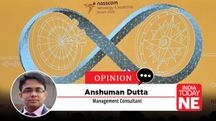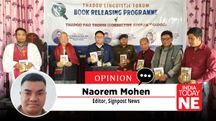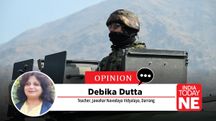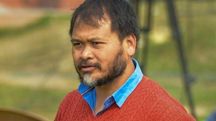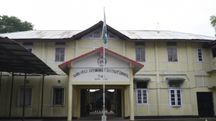Will DBT Give Hope and Dignity to the IDPs in Manipur?
In August 2023, the Supreme Court constituted the Justice Gita Mittal Committee, which has since issued comprehensive guidelines for rehabilitating Manipur's internally displaced persons (IDPs) amid the ethnic violence that erupted on May 3, 2023.

In August 2023, the Supreme Court constituted the Justice Gita Mittal Committee, which has since issued comprehensive guidelines for rehabilitating Manipur's internally displaced persons (IDPs) amid the ethnic violence that erupted on May 3, 2023.
The committee mandates coordinated relief, document restoration, skill development, healthcare access, and dignified resettlement, backed by fortnightly compliance reports and direct Supreme Court oversight.
However, under the President's Rule governance since February 2025, the administration under Bureaucrats bears direct implementation responsibility. Yet, the abrupt rollout of Direct Benefit Transfer (DBT) from November 1, 2025 bypasses this framework, raising a critical question: Why impose a unilateral cash scheme without aligning it to the committee's recommendations?
The core question now confronting authorities is: Why has the President's Rule administration bypassed the Gita Mittal Committee’s structured, consultative framework for IDP support and unilaterally launched DBT without aligning it to the committee’s recommendations on transparency, accessibility, and phased rehabilitation?
The Gita Mittal committee explicitly cautioned against fragmented or top-down financial schemes that risk excluding vulnerable groups, advocating instead for community-driven verification, localized disbursement nodes, and integration with broader rehabilitation goals such as housing and livelihood restoration.
Despite these safeguards, the DBT rollout proceeds with little evidence of prior consultation with the committee, camp-level assessments, or infrastructure readiness—particularly in remote relief sites where ATMs are scarce, digital literacy is low, and banking access remains a daily struggle. This disconnect not only undermines the committee’s emphasis on building trust through inclusive processes but also exposes IDPs to new hardships: irregular crediting schedules, costly and unsafe travel to distant ATMs, repeated failed withdrawals due to cash shortages, and exploitative fees from private mini-ATMs.
By prioritizing a one-size-fits-all cash transfer model over the committee’s holistic, rights-based roadmap, the administration risks transforming a tool of empowerment into yet another layer of exclusion—raising urgent concerns about accountability, coordination, and genuine commitment to the displaced under central rule.
The committee warns against fragmented, top-down aid that excludes vulnerable groups, advocating in-kind, camp-delivered essentials to preserve dignity. DBT terminates these, crediting ₹84 per person daily (₹12,600 monthly for a family of five) to the family heads. IDPs must procure food, water, hygiene items, and more themselves. Proponents claim it curbs pilferage and empowers choice, continuing NFSA rice quotas and pre-September 2025 eligibility.
While some sections of DPs welcome the new DBT system, as it liberates them from intermediaries and agents, they are eager to break free from dependency on ration supplies and other facilities that remain subject to the whims of a few leaders.
Few have raised several critical concerns regarding the new DBT norms set to be implemented in the state. A primary question is whether the DBT amounts will be credited regularly—either every 15 days or on a monthly basis—to ensure predictable financial support.
Additionally, IDPs face significant challenges in withdrawing funds from ATMs, which are typically located far from relief camps, necessitating extra expenditure on transportation. Compounding this issue, most ATMs in the state suffer from chronic cash shortages, forcing IDPs to make multiple visits—often two or three times—which results in wasted time and money. In areas lacking nearby ATMs or banks, the only alternative is mini-ATMs operated by private shops, which impose exorbitant withdrawal fees, further straining the limited resources of displaced individuals.
Meanwhile, in the remote Churachandpur—home to 84 camps housing around 15,000 IDPs—this shifts burdens onto the displaced, exposing gaps in infrastructure, accessibility, and equity.
Two-and-a-half years on, no camp has closed; rehabilitation's three phases (July, October, December 2025) missed two deadlines, the third fading. Children chase promises instead of butterflies; women queue for watery dal; men stare at barren horizons.
Anthony Naulak, a 40-year-old IDP from Imphal, whose parental home is in Gouchinkhup Veng, New Lamka, embodies this limbo. Son of the late Robert Naulak, he is one of them—a displaced father, who could not return back to Imphal, a human being who has seen too much suffering and asked for too little. On July 28, 2025, he sent a detailed representation to the concerned authorities - DC Churachandpur, State Chief Secretary and the Ministry of Home Affairs, Government of India - of enumerating concerns over financial assistance, camp conditions, and aid delivery for the IDPs in Churachandpur.
Building on that, he filed a Public Interest Litigation (PIL) in the Manipur High Court on September 15, 2025—WP(C) No. 25 of 2025—naming the Deputy Commissioner of Churachandpur, the State of Manipur through its Chief Secretary, and the Ministry of Home Affairs, Government of India, as respondents.The PIL was first listed on October 16, 2025. A technical glitch disrupted proceedings for Siam Phaipi, counsel for Anthony, but fairness prevailed—the matter was adjourned to October 28. That day, the hearing proceeded seamlessly.
Anthony’s 39-page PIL was not a legal exercise in abstraction. It was a granular manifesto of survival and dignity of the IDPs in the State. It seeks the authorities to enhance daily assistance to ₹100 per IDP (irrespective of age, gender, ethnicity, or religion) in Churachandpur and all Manipur districts, disburse ₹1,000 assistance five times to current and future IDPs, provide nutritious food including non-vegetarian items weekly with adequate water, establish weekly medical camps with medicines (covering IDPs outside camps), install toilets at a 1:10 ratio, conduct and publish audits of all camp funds on the DC Churachandpur website, and upload all IDP-related communications thereon.
However, after hearing both sides, the court invoked judicial discipline and disposed of the PIL without costs or timelines, forwarding the plea to the committee. The Gita Mittal committee's mandate is holistic: investigate violence against women/children; ensure trauma care, rations, infant needs (milk, pads), sanitation, disease control, counseling; oversee compensation, property restitution, nodals, databases; recognized "third category" for unregistered IDPs.
The committee categorically insists on in-kind delivery until safe returns are feasible, ensuring clean rations, essentials, and infant needs without burdening the vulnerable. In contrast, new DBT ends direct provisions, forcing IDPs to procure everything in hostile markets where prices are inflated—rice at ₹50/kg, dal at ₹120/kg, milk at ₹80/L—turning relief into a daily gamble on blockaded roads.Targeted aid for the most vulnerable is another stark divide.
As the sun sets on yet another day in Manipur's sprawling relief camps, where the echoes of ethnic strife linger like unhealed wounds, the promise of the new DBT system hangs in precarious balance—hailed by some as a step toward autonomy, yet shadowed by profound doubts about its capacity to restore human dignity.
With a meager Rs 84 per head per day—barely enough for a single modest meal, let alone the basics of shelter, medicine, or a child's schooling—this cash lifeline feels more like a tether than true liberation, especially for families already eroded by displacement, ATM treks, and bureaucratic hurdles.
Will it truly empower survival with dignity or merely digitize despair, sidelining the Gita Mittal Committee's vision of holistic rehabilitation amid the administration's selective adherence?
The question remains not just unanswered, but urgently unaddressed, demanding that voices from the camps rise above the policy papers—insisting on accountability, augmentation, and a return to the empathy that once defined relief. Only then can Manipur's displaced reclaim not survival, but a semblance of the lives violence stole away.
Copyright©2026 Living Media India Limited. For reprint rights: Syndications Today
